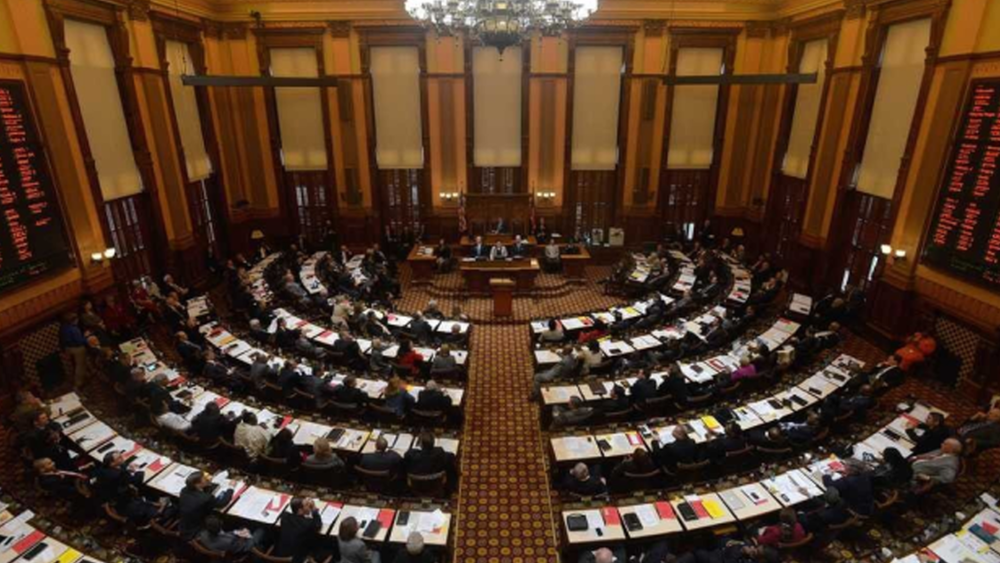
Caption
Georgia’s quick legislative session follows the venerable tradition of part-time or “citizen legislatures,” which date back to the Republic’s founding.
Credit: GPB/File photo

Georgia’s quick legislative session follows the venerable tradition of part-time or “citizen legislatures,” which date back to the Republic’s founding.
Craig Nelson, The Current
March has brought the usual madness, not all from basketball.
In Atlanta, lawmakers are consumed by tinkering, horse-trading, and frayed nerves as they rush to complete their work before the gavel falls on the latest session of the Georgia General Assembly. By April 4, they must decide the fate of 45 bills that cleared the Senate and 60 that emerged from the House of Representatives.
The 40-day session’s frantic stretch run to adjournment, which started in earnest on March 15, the deadline for legislation to pass at least one chamber of the legislature, follows a now-familiar script.
For the media, the deadline — so-called Crossover Day — and the ensuing whirlwind are a staple with a built-in dramatic arc, featuring comic asides. (Topping the list this session was debate on House Bill 1147, legislation allowing the hunting and trapping of raccoons and opossums.) The haggling and caucusing of lawmakers, aides, committee staff and lobbyists are compared to late-night cram sessions at university. Jimmy John’s and pizza deliverers near the Gold Dome bask in the windfall.
Media coverage of Crossover Day often comes complete with the caveat that, to a degree, the whole thing is a legislative fiction. The main actors acknowledge with a knowing chuckle that any legislation failing to make the cut can, with the boost of an influential lawmaker or two, be amended to a bill that did clear the hurdle. Not “do-or-die,” as one media outlet put it, at all.
What this end-of-session whirlwind demonstrates about good government is a different question. So is whether the traditional flurry — and the 40-day legislative session that produces it — are compatible with Georgia’s oft-stated ambition to be a major economic and political player in the nation and lawmakers’ duty to oversee a fiscal year budget now exceeding $30 billion.

Charles Bullock
Charles Bullock, a widely esteemed expert on Georgia politics, has his doubts.
“Four decades ago, Georgia didn’t have half the population we have now—we’re the eighth most populous state in the country. We certainly had a much smaller, smaller budget. The government was doing far less on federal money coming in to be distributed. So, you look at the responsibilities the state has and say, ‘How can you get all that done effectively in a short period of time?’” says Bullock, Richard B. Russell Professor of political science at the University of Georgia School of Public and International Affairs.
Georgia’s quick legislative session follows the venerable tradition of part-time or “citizen legislatures,” which date back to the Republic’s founding. Government was viewed an avocation, something that civic-minded leaders, most often gentleman or yeoman farmer, did in the off-season. Such part-time legislators have one foot back in their “real life,” so that they can stay more connected to the concerns of “regular” people.
Today, proponents of Georgia’s current, relatively short legislative sessions say it focuses the minds of lawmakers. Longer sessions, they say, are fuel for bigger, more intrusive government. Give lawmakers more time, the argument goes, they’ll make more mischief — that is, raise taxes, spend the money of hard-working people on frivolous pursuits, and poke government’s nose even more deeply into everybody’s business.
“Look at the states that have full-time legislatures — New York, California, Illinois — are they producing better products? I just don’t really think so,” says Republican Sen. Ben Watson, who represents the 1st District, which covers Savannah’s southern suburbs and a splinter of Savannah itself.

Sen. Ben Watson
“I’m of the firm opinion that less is more,” Watson says, pointing to the circumscribed legislative sessions of Florida, Texas and Alabama. “We’ve been doing this for over 200 years.”
Still, 40-day legislative sessions and part-time lawmakers do seem anachronistic at times.
The issues facing state governments have expanded dramatically in recent decades and with it, the scope of their work, from the environment and economic development to health care. Short legislative sessions and part-time lawmakers have difficulty meeting the challenge. More problematic still is the lack of ethnic, gender, and economic diversity that the citizen legislator model engenders.
Ohio and Michigan, states with populations comparable to Georgia’s, have full-time legislatures, while North Carolina features what the National Conference of State Legislatures classifies as a “hybrid legislature” — not part-time but not quite full-time. According to the NCSL, hybrid legislatures spend more than two-thirds of a full-time job as legislators, even though their income is not enough to support them.
Bullock says Georgia’s lawmakers are paid “very poorly.” Current base pay for representatives and senators is $17,342.
“We have students working part-time in fast-food restaurants that make more the legislators do,” he says.
Worse yet is the power vacuum Bullock says is created by a short session and poor pay. The executive branch, the governor and those who run the state’s programs are full-time. The result, he says, is inadequate oversight over programs approved by the legislature and a tilt in government in favor of the executive branch and lobbyists, who also work full-time.
“The lack of resources we give our legislators means that the legislators have to turn to lobbyists for information. Virtually every legislator I’ve talked to about the role of lobbyists says we really couldn’t function without the lobbyists who are in Atlanta to give us information,” he says.
Watson, the 1st District’s senator, ridiculed as “crazy talk” the notion that short legislative sessions tilt power away from lawmakers and towards lobbyists and permanent staff. Anybody who says that “doesn’t actually know what’s going on,” he said.
Lawmakers are seeking to address some of the problems caused by a system of part-time lawmakers ceaselessly running for reelection.
Under a House resolution, pay for Georgia’s 180 House members and 56 senators would rise to 60% of the state median household income, rising to about $36,000, if voters approved. House Bill 824 would increase the pensions of senators and representatives by about 40%. Meanwhile, Senate Resolution 623 would create four-year Senate terms beginning in 2024, instead of the current two-year terms, if voters approve the state constitutional amendment.
Watson says a longer term for senators makes sense because the Senate “should be a little bit more deliberative and thoughtful.” Also, he adds, with a two-year term “you’re always running” for reelection. But the chances that a term extension for senators will be passed in this session of the legislature are nil, he says. “The House is not going to go along with it.”
While debate about salary increases and term extensions continue in the waning days of the legislature’s 156th session of the State Assembly, there is for now, no talk in Atlanta about extending the legislative session to face the challenges of state government in the 21st century. Georgians will get what they pay for, for good and ill.
“It’s perceived by legislators, probably accurately, that Georgians tend not to want to pay much for their government,” Bullock says. Asked if he sees a change in the length of the legislative session in his lifetime, Bullock pauses.
“Well, as I’m approaching 80, I’m not sure I will. You may.”